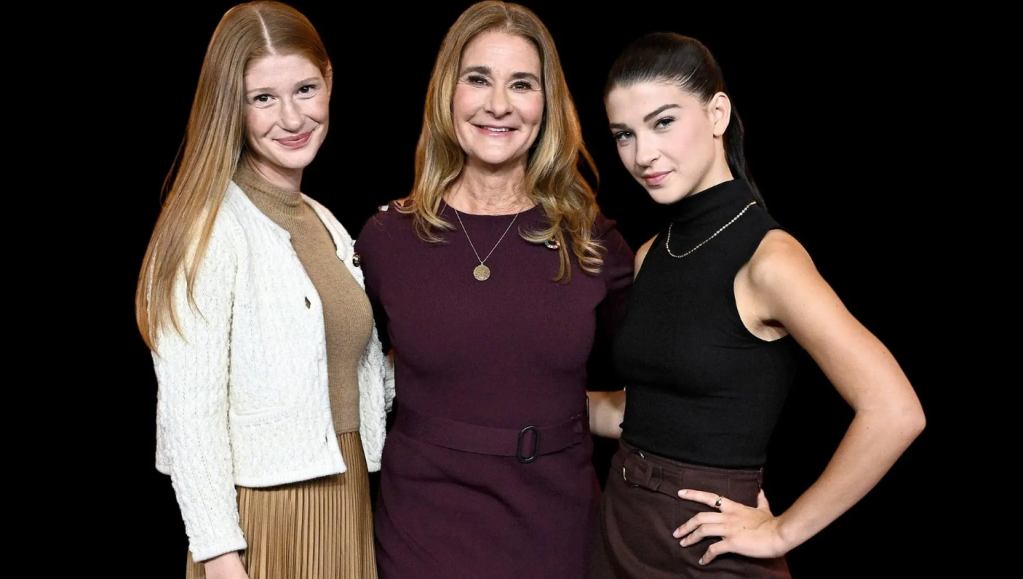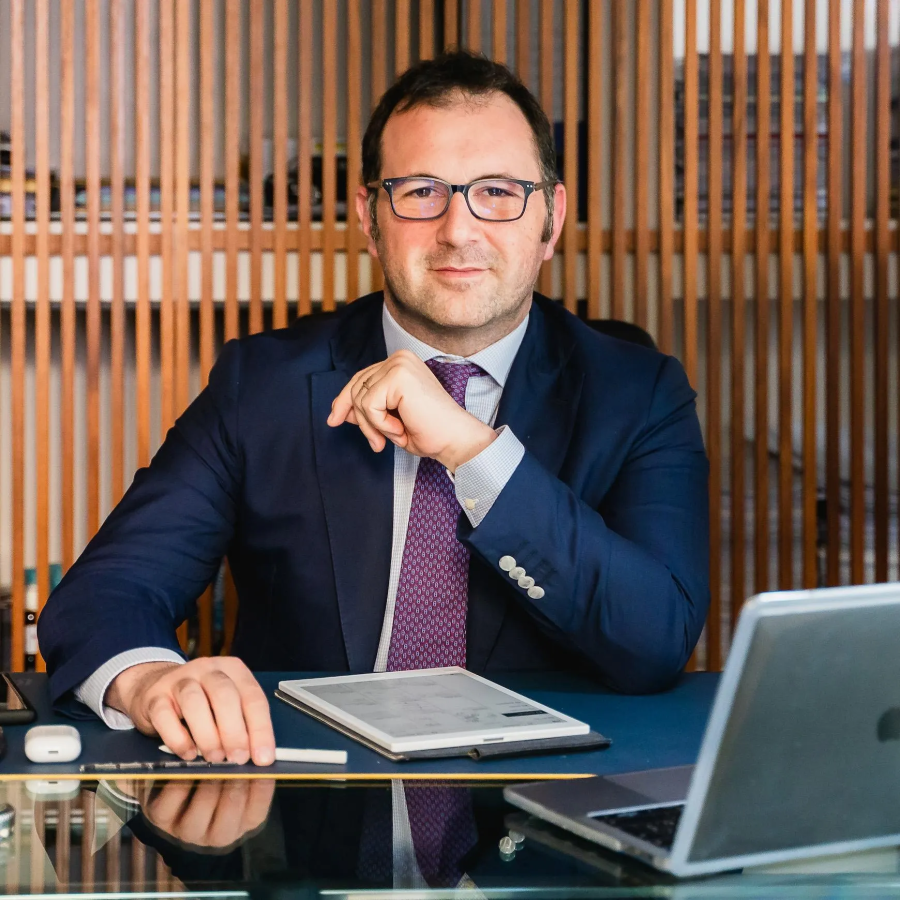Gates and daughters join 14 other families to address three critical issues globally: maternal health, sexual and reproductive health, and gender-based violence.

On a Sunday evening ahead of the 80th session of the United Nations General Assembly in New York, an impressive gathering of movers, shakers, and change agents assembled in the dimly-lit confines of the chic Bowery Hotel downtown. From former supermodel and activist Christy Turlington Burns to Tarana Burke, founder of the MeToo movement, the room buzzed with purpose and intent.
All had gathered at the behest of the secretive investment powerhouse Iconiq, the multi office behind some of the world’s most powerful figures, including Mark Zuckerberg and Jack Dorsey. The mission was clear: galvanise support behind a groundbreaking new $100 million initiative aimed at addressing some of the most pressing challenges facing women globally today.
In a world where a woman dies in pregnancy and childbirth every two minutes, and one in three women experience violence in their lifetime, Iconiq has joined forces with founding supporters Melinda French Gates, her daughters Jennifer Gates Nassar, and Phoebe Gates—alongside fourteen other donors including Iconiq co-founder Divesh Makan and his wife Diksha—to launch the Women’s Health Co-Lab. The new collaborative philanthropy fund, created in partnership with Co-Impact, aims to mobilize resources to improve the health and agency of millions of women and girls worldwide across three critical focus areas: maternal health, sexual and reproductive health, and gender-based violence.
“I’ve spent the past decade trying to understand the barriers that keep women from stepping into their full power, and this much is clear: There is no path to equality in a world that neglects women’s health.”
Melinda French Gates, philanthropist & founder, Pivotal Ventures
“I’ve spent the past decade trying to understand the barriers that keep women from stepping into their full power, and this much is clear: There is no path to equality in a world that neglects women’s health,” says Melinda French Gates, philanthropist and founder of Pivotal Ventures. “I’m so heartened by the growing coalition of philanthropists, particularly this next generation of leaders, who are insisting that women’s health and agency deserve a place on the global agenda. The solutions to the challenges that women face exist; we just need to invest in them.”
Iconiq’s announcement comes on the heels of another major Gates initiative announced earlier this month at the Forbes Power Women’s summit: a $100 million partnership between Pivotal Ventures and nonprofit Wellcome Leap to fund two new programs launching next year targeting underfunded areas like women’s mental health and autoimmune disorders. Both of these are the latest initiatives French Gates has made in support of women’s health in the U.S. and across the globe.
The Urgency of Now
The stark realities faced by women today paint a sobering picture. According to the World Health Organization, about 260,000 women died during and following pregnancy and childbirth in 2023, with approximately 92% of all maternal deaths occurring in low-and lower-middle-income countries. Moreover, the U.S. has the highest maternal mortality rate of any high-income country, with 80% of deaths classified as preventable—a vast void in the dream for progress issued by former U.S. First Lady and Secretary of State Hillary Rodham Clinton’s rallying cry that “women’s rights are human rights” in Beijing thirty years ago.
“Women and girls are facing threats to their power and agency—from preventable deaths in childbirth to the erosion of reproductive freedoms,” stresses Olivia Leland, Founder & CEO of Co-Impact. “Now is the moment for philanthropy to meet them with the scale, flexibility, and trust they need.”
That specific blueprint is precisely the trifecta that Iconiq hopes to leverage with its latest Co-Lab effort. Starting with over $70 million in initial commitments, the Co-Lab will support 22 organizations with unrestricted funding over three years while seeking an additional $30 million to fully fund its ambitious goals.
Select grantees across the three key focus areas of maternal health, sexual and reproductive health and rights, and gender-based violence include: Christy Turlington Burns’ Every Mother Counts on strengthening healthcare delivery systems, Americans for Contraception on expanding healthcare access, and Ujamaa Africa on strengthening protective policies and shifting patriarchal norms, to mention a few.
“Our entire ethos is lowering the barrier to effective philanthropy for large-scale donors,” says Matti Navellou, head of Iconiq Impact, the arm of the organization running the Co-Lab. “A big part of that is encouraging our community (mostly tech founders) to give collaboratively.” The belief is that collaborative giving can increase the pace of giving while relieving some of the burden on families to build out extensive philanthropic teams. “There’s an efficacy around leveraging Iconiq Impact to move large amounts of capital out the door fully.”

Iconiq co-founder Mike Anders & Impact Head Matti Navellou at private reception for donors and grantees.
Brindamour Studios
Iconiq Impact has launched 4 other Co-Labs since 2021, covering issues such as economic mobility, climate change, and youth mental health. To date, Iconiq Impact has advised on $915 million in grantmaking.
“Philanthropy too often dictates terms—we try to do the opposite,” adds Leland. “And that’s where our partnership with Iconiq Impact is so powerful—we share the belief that philanthropy achieves the most when it provides long-term, flexible support and trusts in local leaders who know their systems best.”
For Christy Turlington Burns, founder of grantee Every Mother Counts, the urgency is deeply personal. “I became a global maternal health advocate the day that I became a mother,” she says. After an otherwise very normal pregnancy without complications, Burns hemorrhaged after the birth of her daughter. “It was really [after] returning from the hospital where I asked the question, what about the millions of girls and women around the world who don’t have access to that quality and respectful level of care?”
For 23-year-old Phoebe Gates, women’s health advocate and Founder and Co-CEO of Phia, driving real progress is the main goal. “Two percent of philanthropic dollars go toward women’s health. Philanthropy will never replace government cuts and the devastating impact of [defunding] USAID,” she says.
Gates also believes that who you fund with is just as important as what you fund. “This came [together] from a meeting with Matti, who said, ‘We have so many people passionate about this issue who don’t know where to start’. We all wondered, what if we did this together to give the leaders on the ground the resources that they need?”
“Two percent of philanthropic dollars go toward women’s health. Philanthropy will never replace government cuts and the devastating impact of [defunding] USAID.”
Phoebe Gates, philanthropist & Co-CEO Phia
The Economic Imperative
The Co-Lab represents more than philanthropic giving—it’s a strategic investment in global health and economic stability. Despite gender-based violence costing economies up to 2% of GDP in measured countries, it receives just $500 million of the $14 billion annual health investment through Overseas Development Assistance—a mere 0.5% of total aid.
“Investing in gender-based violence prevention has intergenerational benefits,” notes Dr. Avni Amin from the World Health Organization’s Department of Sexual and Reproductive Health. “Compared to many other areas of health and development, investments in gender-based violence prevention and response are a drop in the ocean, while the returns on investment for women, families and communities are potentially huge.”

Christy Turlington Burns greets traditional midwife Angela Delgado during her trip to Guatemala.
Janet Jarman, 2022
The ripple effects of gender-based violence extend far beyond individual suffering. According to Dr. Amin, the World Health organization estimates gender-based violence not only devastates women’s health but also impacts the health and well-being of their children, families, and entire communities.
“In countries where the economic impact has been measured, gender-based violence costs the economy millions of dollars due to healthcare costs, police and legal services, housing, shelters, and social services expenses,” says Dr. Amin.
In an era where women’s rights and health face unprecedented threats globally, time will tell if the Co-Lab proves itself to be a progressive new model that could ultimately reshape how the sector addresses complex challenges.
Michael Anders, co-founder of Iconiq, positions the Co-Lab as both an opportunity to have impact and a call to action.
“One of the best investments you can make for the long-term health of society is women’s health, and Iconiq Impact is uniquely positioned to do this at scale and in a way that inspires others to join us.
Look back on the week that was with hand-picked articles from Australia and around the world. Sign up to the Forbes Australia newsletter here or become a member here.


